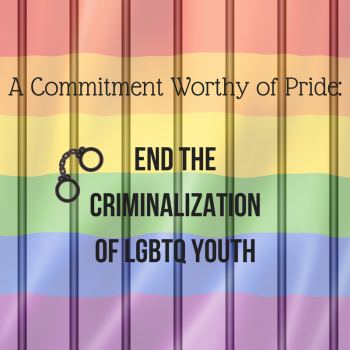A Commitment Worthy of Pride: End the Criminalization of LGBTQ Youth

By Shannan Wilber
Pride Month is an opportunity to commemorate the history of the LGBTQ civil rights movement and celebrate the milestones of social and political progress. It is also an opportunity to acknowledge LGBTQ people who have not benefited from these gains, and commit to ending their oppression.
Queer and transgender youth involved in the juvenile justice system are among the least empowered and most jeopardized members of the LGBTQ community. They are significantly overrepresented in the justice system, constituting 20% of youth in detention across the country – over twice their numbers in the general population. At least 85% are youth of color. The overwhelming majority of youth who populate the nation’s juvenile prisons come from communities of concentrated poverty. These youth live at the intersection of racism, poverty, and anti-LGBTQ bias. Cumulative disadvantage places them on a collision course with homelessness, school push-out, social isolation, and public systems of care that disparage and pathologize their core identities. These risks pave a well-worn path to the justice system.
The abuse directed at LGBTQ youth in their communities is even more pervasive in detention facilities and correctional settings. These youth are more likely than their straight and cisgender peers to be:
- Detained for truancy, warrants, probation violations, running away, and sex work -- low level and victimless offenses related to economic and social marginalization
- Abused verbally, physically or sexually by staff or other youth
- Locked up solely because the system has no placements or community-based alternatives competent and willing to serve them
- Isolated for their own protection
- Punished for expressing same-sex attraction, transgressing gender norms, or defending themselves against harassment
These structural betrayals further imperil LGBTQ youth -- compromising their health, interrupting their education, narrowing their opportunities, and robbing them of the basic supports necessary to successfully transition to adulthood.
Juvenile justice advocates have long fought for reforms to transform the current punitive and harmful system to one in which the health and well-being of our most vulnerable youth is the defining objective. Sustained activism has culminated in campaigns to close youth prisons, end the practice of prosecuting youth in adult criminal courts, invest in community-based alternatives, end the use of solitary confinement, ensure that youth in conflict with the law receive quality legal representation, and engage and collaborate with families.
The voices and experiences of LGBTQ youth must inform the transformation of the current system. Given the uniquely critical role of families in promoting the health and well-being of LGBTQ youth, systems must engage families to help them support and accept their children. Community-based alternatives must be welcoming and affirming of LGBTQ youth. Juvenile defenders and juvenile court judges must be competent to recognize and remedy discriminatory treatment of LGBTQ youth at all stages of the delinquency process. Professionals working at the front end of the system must understand how to assess the risks associated with anti-LGBTQ bias. Juvenile justice systems must collaborate with other youth-serving systems to create a continuum of supports aimed at preventing mistreatment of LGBTQ youth in their homes, schools and communities.
Like all youth, LGBTQ youth have the inherent capacity to thrive and make positive contributions to their communities. Supporting their health and well-being is a commitment worthy of pride.
Shannan Wilber, Esq. is the Youth Policy Director at the National Center for Lesbian Rights, a role dedicated to reaching out to the most vulnerable LGBT youth across the country and working on their behalf to advance their safety, inclusion, and well-being.

